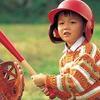 (ARA) - "My favorite part of summer is when the whole neighborhood gets together to play a huge game of tag," exclaims 11-year-old Abigail Lafferty from Pennsylvania. "That and no school for three months!"
(ARA) - "My favorite part of summer is when the whole neighborhood gets together to play a huge game of tag," exclaims 11-year-old Abigail Lafferty from Pennsylvania. "That and no school for three months!"
For kids - and their parents - who have waited months to get outside to play, warm and sunny days mean it's time for tee ball, skateboarding, swimming and tons of outdoor fun.
But for children who suffer from seasonal allergies, warmer weather can mean the onset of symptoms such as sneezing, itchy, watery eyes, runny nose and itchy throat.
"More than 6 million children suffer from seasonal allergies that can be triggered during outdoor physical activity," says nationally renowned pediatrician Dr. Jennifer Trachtenberg, who is a member of the American Academy of Pediatrics.
A mother of three and a clinical instructor at Mount Sinai Medical Center in New York, Dr. Trachtenberg recommends giving your child an allergy medication that is designed for children, like Children's Benadryl(R) Allergy Fastmelt(R) tablets, which can help relieve allergy symptoms and get them back outside. The easy-to-use, rapidly dissolving tablets offer an effective, painless solution for getting your child to take his medication.
Allergies are not the only thing that can curtail summer fun. Dehydration, skinned knees, stinging insects and sunburn can also prevent your child from enjoying outdoor activities.
"Before you send your kids out to play, be sure to take a few common-sense precautions," says Dr. Trachtenberg.
Here are some summer outdoor safety tips for parents based not only on her years of practicing medicine, but also her experience as a mom to two young boys and a little girl.
1. Don't get burned - Apply sunscreen to children generously and let it soak in for 15 to 30 minutes before they go outside. Cover all exposed skin, including ears, nose and neck and apply an SPF 15 lip screen as well. Make sure to reapply every two hours, or more often if kids are sweating or swimming.
2. Beware of poisonous weeds - Know how to identify poison ivy, poison sumac and poison oak - all are plants that produce a sap that can cause a red, swollen rash or blisters. Poison ivy has bright green leaves consisting of three irregular leaflets. Small greenish flowers grow in bunches attached to the main stem. Poison oak also has three leaflets, but the lobes are much more deeply cut. Poison sumac has green flowers and loose clusters of white fruits.
3. Bee careful - Keep bees away by having kids avoid perfumed soaps, shampoos and deodorants and wearing light-colored clothes, which attract fewer bees than dark clothes. If a bee does land on your child, tell him to act like a statue - swatting at a bee can encourage it to sting. If your child gets stung, wash the area with soap and water and apply ice to reduce the swelling.
4. Stay hydrated - Make sure your kids drink adequate liquids before, during and after outdoor activities. Kids can get easily dehydrated when they spend a lot of time outdoors, so know the symptoms: thirst, weakness, headaches, dark-colored urine or a slight decrease in body weight.
5. Minor scrapes - When your child ends up with skinned knees or elbows, stop the bleeding with direct pressure, and remember to follow the 3C's: Clean the wound with a gentle soap and water; Coat with an antibiotic ointment to prevent infection and help reduce scarring; and Cover the wound with a sterile bandage to protect it from further injury.
Keeping these simple guidelines in mind will ensure that both kids and parents have a fun, relaxing summer.
For more information on seasonal allergy prevention or Children's Benadryl Allergy Fastmelt tablets, visit www.benadrylusa.com .

Welcome to 'OZ' - The 'Other' Side of the Rainbow!! Posting is at 10AM, Noon and 2PM CST daily. Up to 12 days of posts on the main page. The archives have more. You can forward posts by clicking on the envelope at the bottom of the post. Enjoy your stay! *** If you need to contact me, or have a copyright issue, please use the "Contact The Wizard" form on the left side of 'OZ'. Original source and author is cited and credited in each post where possible. ***
***Disclaimer***
Disclaimer: The Wizard of 'OZ' makes no money from 'OZ' - The 'Other' Side of the Rainbow. 'OZ' is 100 % paid ad-free
Tuesday, June 28, 2005
Don't Let Allergies Keep Your Child Inside This Summer
Subscribe to:
Post Comments (Atom)
No comments:
Post a Comment